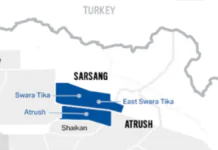
U.S. prosecutors have charged Cambodia’s Prince Group and its chairman Chen Zhi with wire fraud and money laundering, after seizing more than $14 billion worth of Bitcoin — one of the largest financial crackdowns in history.
What happened
Prince Group, led by Chinese-Cambodian businessman Chen Zhi, claimed to be a big multinational company with interests in real estate, finance, and consumer services.
But according to the U.S. Department of Justice (DOJ), that image was fake.
Behind the scenes, it was actually a huge criminal network built on crypto scams, human trafficking, and money laundering.
The DOJ says Chen ran a massive operation across Southeast Asia, using fake companies and scam compounds to steal money from people around the world.
He now faces up to 40 years in prison if convicted.
Inside the scam network
Court documents say Chen was running at least ten scam compounds in Cambodia.
There, trafficked workers were reportedly forced to run online scams known as “pig butchering” — fake romance and investment schemes that trick people into sending money.
Assistant Attorney General John A. Eisenberg described how victims were exploited:
“Trafficked workers were locked inside compounds and forced to carry out scams on an industrial scale, preying on thousands worldwide, including many in the U.S.”
Cambodia has become a major hub for such criminal setups, along with countries like Myanmar, Laos, the Philippines, Malaysia, and Vietnam, where scam networks have grown rapidly in recent years.
The technology behind the fraud
Inside Chen’s compounds, investigators found large “phone farms” — rooms filled with hundreds of phones used to contact potential victims.
Two of these farms had about 1,250 phones managing over 76,000 fake social media accounts.
Authorities also found internal documents from Prince Group showing detailed instructions on how scammers were told to act.
They were trained to sound believable — using realistic online profiles, chatting regularly with victims, and avoiding profile photos that looked “too perfect” to seem more authentic.
Laundering billions through crypto
Prosecutors say Chen and his team used the stolen money to live a luxurious life — buying private jets, mansions, and rare art pieces — while using complex crypto transactions to hide the source of their wealth.
The group used advanced crypto laundering tricks called “spraying” and “funneling.”
Spraying means quickly spreading stolen crypto across thousands of wallets to make tracking harder.
Funneling means moving funds through many middle wallets and exchanges before converting them into stablecoins or cash.
They also used crypto mixers, OTC brokers, and offshore exchanges to move money quietly through the global financial system.
During the investigation, authorities seized around 127,271 Bitcoin from wallets linked to Chen and his network.
Those assets are now in U.S. custody while the case continues.
What’s next
Chen remains on the run, and his current location is unknown.
The U.S. says international efforts to capture him are still ongoing.
Prince Group has now been labeled a transnational criminal organization, and several people linked to the group have been sanctioned by U.S. authorities.
This isn’t the first case of its kind.
Last year, the U.S. also sanctioned another Cambodian business empire, led by tycoon Ly Yong Phat, for running similar crypto scams that used trafficked workers.
The case against Prince Group highlights how crypto crime, human trafficking, and financial fraud have become deeply connected — and how global authorities are starting to take serious action against them.







